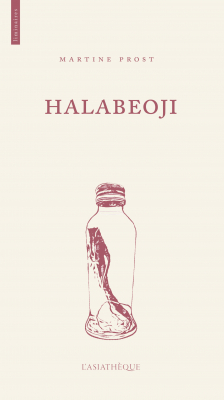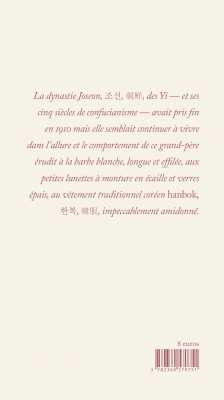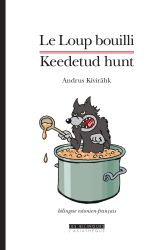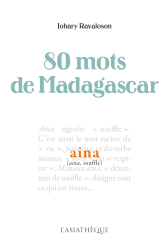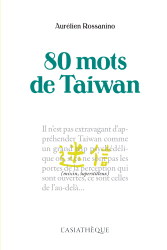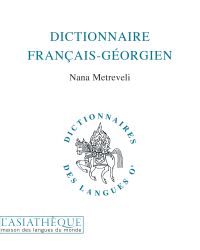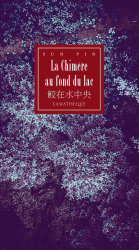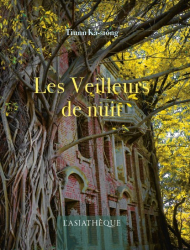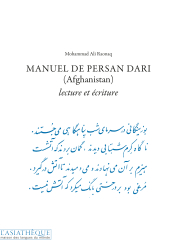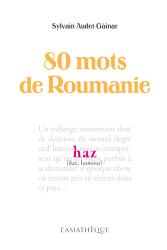Details
Format: Paperback
ISBN: 9782360570751
Collection: Liminaires
10.1 x 18 cm
Weight: 60 gr
Pages: 56
First publication: 06/01/2016
Last printing: 01/2016
Halabeoji
The Joseon Dynasty, Yi - and its five centuries of Confucianism - had ended in 1910, but it seemed to live on in the aspect and mannerisms of this scholarly grandfather, with his long, white, slender beard, his narrow spectacles, and his traditional Korean hanbok dress, immaculately starched. In order to marry her Korean boyfriend, a young French girl meets his family and must obtain the consent of his grandfather, an old scholar who specialises in plants.
PRESS REVIEW
Stories from the Land of the Morning Calm
"... The precise and humorous prose of Martine Prost, author of Scène de vir en Corée, introduces us finely into Korean culture ..."
Halabeoji
"... With an omnipresent humor, a great delicacy and a writing imbued with sweetness and poetry, Martine Prost here opens the door to this country anchored in its traditions, those born, linked and inherited from Confucianism and reveals to us the rigors , the requirements and, a little too, the extremes. (...)
Korea, country of scholars
"... little gem of humor, you recall your first meeting, in the early 1980s, with your future Korean husband's grandfather. An omnipotent patriarch, who chooses the first names of all and authorizes, or not, marriages ... "
Journey to the Land of the Morning Calm
“... The text is both accusing and very moving. A literary and political slap, which demonstrates the failure of totalitarianism ... "
The woman who married Rising Racine
“... It is with an alert pen and a lot of humor that Martine Prost leads this short but dense story. (...) This funny and touching book allows (...) to feel what the Korean culture can have for us surprising, confusing, and also endearing. It is a whole mental universe, a whole rich and subtle culture which is offered to us through this story ... "
« ... Ce texte, sous ses dehors humoristiques , et cette parure de livre de souvenirs et malgré se brièveté permet d'en savoir un peu plus sur les traditions de la Corée, sur le rôle de la femme, l'ancrage des us, la difficulté que ceux-ci peuvent représenter pour un étranger, l'accueil chaleureux des Coréens...
Cette histoire se déroule au milieu des années 80, sans doute le pays a-t-il beaucoup évolué puisqu'il est désormais le pays le plus connecté au monde ... »
Halabeoji
“... In the end, Halabeoji is a short work, but surprisingly balanced. The book reads very quickly, without downtime. One could even say that he devours himself. A very nice discovery, which we recommend to curious readers from other cultures, but also to specialists in the subject, who will discover a point of view with a pleasant style ... "
Halabeoji
"... We cannot resist the sharp pen of Martine Prost, the intimate and immediate access to Korean culture that she allows in the lively and tender manner with which she evokes her entry into Seun-geun's family and man / woman relations in Korea ... "
Halabeoji
"... The author evokes in this story, the power of ancestral beliefs and the respect due to elders, the nature of male / female relations and certain traditions, such as the fact, for example, that the Korean man is allowed to take a concubine if his wife does not make him a boy quickly enough ... "
Halabeoji
"... Through this personal experience told with a mixture of tenderness and ironic detachment, Martine Prost evokes the relationship between men and women, the place of the latter in society, but also a country in full change, resolutely turned towards modernity. while carefully preserving ancestral traditions and beliefs.
A simple, beautiful text, full of love and humility. A great discovery ... "
CONTRIBUTORS' BIOGRAPHIES
Martine Prost

Martine Prost, Ph.D. in linguistics, was a lecturer at the UFR de langues et civilisations orientales of the Université Paris-Diderot and director of the Institut d'études coréennes at the Collège de France. Married to a Korean and now retired, she lives in Korea. Her books include Scènes de vie en Corée (2011) and Halabeoji (2016), both published by L'Asiathèque.
Photo : © Philippe Thiollier
